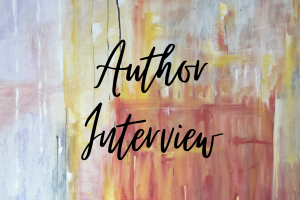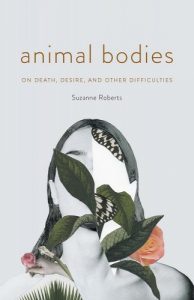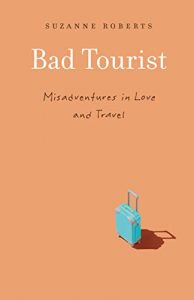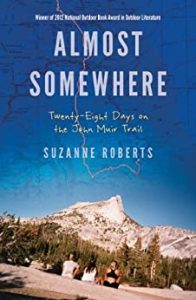Struggling in Our Animal Bodies: An Interview with Suzanne Roberts
 The internet can bring good people together, and author Suzanne Roberts is one of those people. We crossed paths in a Facebook group, and when I heard about her book to be released this year, I knew I wanted to interview her. That book, Animal Bodies: On Death, Desire, and Other Difficulties, came out last month from University of Nebraska Press. The publisher’s description informs the reader that “Roberts interrogates her memory and tries to make sense of her own private losses,” which in turn allows the reader to interrogate their own. And readers are enjoying this varied collection of essays, calling it “personal,” “full of vulnerabilities,” and a book that “honors the complexities of life.” Of course, I would have to agree. Suzanne, an award-winning author, has multiple other books available, teaches at Sierra Nevada University, and loves to travel. A book launch is always a hectic time for an author, so I’m grateful she found the time to answer a few questions of mine.
The internet can bring good people together, and author Suzanne Roberts is one of those people. We crossed paths in a Facebook group, and when I heard about her book to be released this year, I knew I wanted to interview her. That book, Animal Bodies: On Death, Desire, and Other Difficulties, came out last month from University of Nebraska Press. The publisher’s description informs the reader that “Roberts interrogates her memory and tries to make sense of her own private losses,” which in turn allows the reader to interrogate their own. And readers are enjoying this varied collection of essays, calling it “personal,” “full of vulnerabilities,” and a book that “honors the complexities of life.” Of course, I would have to agree. Suzanne, an award-winning author, has multiple other books available, teaches at Sierra Nevada University, and loves to travel. A book launch is always a hectic time for an author, so I’m grateful she found the time to answer a few questions of mine.
Christina: Congratulations on Animal Bodies: On Death, Desire, and Other Difficulties, which was released in March. As the name implies, this book “explores the link between death and desire and what it means to accept our own animal natures.” Where did the idea for this collection come from? How long did it take to come to fruition?
Suzanne: I’ve been writing the essays that are collected in Animal Bodies for the past decade. The oldest essays are more than ten years old, and the newest ones were written last year.
A few years ago, I realized a lot of my work was about grief, so I originally put the collection together with that in mind. I had originally organized the book by the stages of the Kübler-Ross Grief Scale, ironically though, because I don’t think our grief follows a tidy line from denial to acceptance, and honestly, sometimes we never come to accept certain losses, and that’s okay.
And then a couple of things happened. First, I was listening to Claire Bidwell Smith’s The Rules of Inheritance, and I realized her memoir was structured by that grief scale, so I saw that what I was doing wasn’t new or original. This is why we must read widely and deeply. Often what we think is an innovation isn’t. Someone else has already done it and done it better.
I also saw that it was not only about grief but also about desire, aging, mortality, and what it means to be in these bodies, and more specifically how we struggle in our animal bodies, and maybe more specifically female bodies. I kept that in mind as I compiled and organized, wrote and rewrote.
Christina: With respect to your writing in Animal Bodies, poet Lee Herrick said, “Roberts bravely recalls the deaths of her alcoholic father, her dear friend, and her mother, a complex force in her life.” The book is not for the faint of heart, that’s for sure. How did you find the courage to write about these deeply affecting periods in your life, and was the process healing for you?
Suzanne: I’m not sure it takes courage to write about these things. One thing is certain: it’s much harder to have lived through them than to have written about them. And I’m not sure the process was healing, exactly, but it did help me to sort out some of my feelings. I’m writing a memoir about taking care of my mother when she was dying, and that book has been nearly unbearable to write, not so much because of the illness and death but because our relationship was so very complicated and when I’m trying to be really honest, to tell the truth, I have to look at things I would rather no think about. And some days, I’m not even sure why I’m driven to do so.
Christina: Your bio states that you are a “travel writer, memoirist, and poet.” Does the order of that description matter? Does one genre call to you over the other? Or do the stories themselves determine the genre?
Suzanne: I don’t think it’s very useful to divide things by genre, and I see myself more as a storyteller. I am deeply interested in place but also travelling through emotion, which is often connected to a place in the world. And yes, the story determines the genre, but sometimes it takes a while for me to listen to the piece and see what it wants to be. There’s a number of essays in Animal Bodies that could as easily be called poems as lyrical essays. One of them, which is a paragraph and could easily be called a prose poem, was cut out of a ten-page essay. I realized everything I wanted to say was in that one paragraph, so I cut the rest. Talk about killing our darlings!
Christina: As a writing teacher and coach, you’ve encountered a multitude of different writing styles and perspectives. What is the greatest lesson you’ve learned from a student or client?
Suzanne: Students have reminded me that it’s always about the work. I’ve had students who wanted a published book or a degree or even a grade without putting in the very humbling and difficult work to get there. I have also had students who keep working, keep striving, keep listening, and those are the writers. To be a real writer, the only requirement is to write. It’s not about talent. It’s not about publications. It’s about the work of writing.
Christina: Your website features a section with Writing Prompts. I love prompts because they often result in work that we never imagined. Where do you get your ideas for writing prompts? Do you use prompts when crafting your own work?
Suzanne: For my Substack newsletter, I make up themed prompts that build on one another each month. I’ve been teaching writing for the past 25 years, so many of these prompts come from things I have tried in the classroom or in writing workshops, they have come from attending other writer’s workshops, and they have come from craft books. I just wrote a prompt today that I’m sure came from a craft book at one point, but I can’t remember which one (and I admit to this in the newsletter). If I ever use a prompt directly from another writer, I give credit. But when I write them, I sit down to the blank page and just see what comes out of my head, though my head has a lot of other people’s ideas in it, too.
And when I teach workshops, I always write from the prompts with my students and many of my poems and essays have come from these prompts.
Christina: Before we ever “met” online, I applauded your Brevity Blog post entitled, “I Acknowledge Nobody,” in which you talk about the lessons you’ve learned from one Acknowledgments page in particular. In that post, you “vowed not to include an acknowledgments page in my next book.” And yet, Animal Bodies does have an acknowledgments page (though it is sparse). What was your rational for including a page despite your vow? Will you be as careful going forward with acknowledgments on future books?
Suzanne: In the new book, I only acknowledge my editor, permissions to use other’s work (such as Ilyse Kusnetz’s poem), and the publications where some of the essays have appeared, which is really different from my other acknowledgments pages, where I thank all kinds of people for their support. So I really did leave out the acknowledgments this time. I hope those who read my work and offered suggestions know I appreciate them, and I think they do. My next book is about taking care of my mom when she was dying of cancer, and there were a lot of people who supported me through that. I haven’t decided what I will do about an acknowledgments page for that one, but yes, I will continue to be careful.
Christina: Of course, I feel compelled to ask: If you could travel anywhere right now, where would it be and why? And with whom would you travel, or would you go alone?
Suzanne: I would like to see some of the places that are changing and disappearing due to climate change and environmental devastation. At the top of that list is Antarctica, though it’s a very expensive trip, one that we’re not in a position to take at the moment, so for now, my husband and I are taking van trips in our 1999 Ford Econoline named Shrek (he’s green, of course).
Suzanne can be found in multiple places!
Website: https://www.suzanneroberts.net/
Instagram: @suzanneroberts28
Twitter: @SuzannneRoberts
Facebook: @suzanne.roberts798
Thanks to Suzanne for agreeing to this interview! If you know of an author who’d like to be featured in an interview (or you are an author who would like to be featured), feel free to leave a comment or email me via my contact page.



